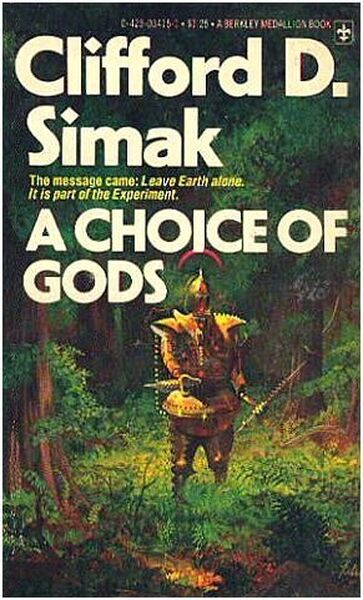Gone Away
A Choice of Gods
By Clifford D. Simak

17 Nov, 2024
Clifford D. Simak’s 1972 A Choice of Gods is a stand-alone science fiction novel.
One day in 2135, eight billion humans vanished. For unknown reasons, whatever did this spared a handful of humans (as well as every robot on Earth) and every other living thing on the face of the planet.
Thousands of years later…
Those remaining on Earth are astonished to discover that they are now aging immeasurably slower than they had before the event. Lifespans now span millennia. This gives the humans time to discover paranormal talents that mayfly humans had only speculated might exist.
Rustics like the Whitneys discover they can, by an act of will, step from one habitable world to another. The galaxy was theirs to explore as they saw fit. Native Americans like Red Cloud discover an enhanced connection to nature. They use this to embrace their old traditional folkways (or rather, a mélange of pre-Columbian folkways), wandering what was once America. David Hunt’s people are timorous nomads, forever fleeing a shadowy pursuer whose nature they do not understand. David’s gift is one he does not fully understand.
This leaves the robots. Built to serve humans, they survive the loss of humans in three ways. Robots like Thatcher serve Jason Whitney and his wife Martha. Hezekiah and his fellow robot monks embrace the Christian religion humans had abandoned. Stanley and his R&D robots turn to self-improvement, exploring the limits of robotic potential.
This existence, pleasant for everyone save David’s people, flourished for thousands of years. Then came two calamitous discoveries:
- Something vast, cold, and indifferent lives at the center of the Milky Way. Its intelligence and power are immeasurably greater than human, as is its power. Human nomads whose minds touch the Principle’s are repulsed by the experience.
- The People—the humans removed from Earth—were not disintegrated. Nor did most of them die. They were transported to three Earthlike worlds closer to the galactic core. Like their terrestrial kin, their lifespans were tremendously enhanced. Where the people of Earth focused on developing their mental abilities, the People continued down the path of advanced technology.
Among the People’s achievements, faster-than-light starships like the scout ship currently headed towards Earth.
Will this be a happy reunion? Or is Earth about to see a recapitulation of the conquest of the New World? Or, just perhaps, is there a factor all sides have overlooked that renders human and robot decisions moot?
~oOo~
Should I have a meant-well tag? Simak is sympathetic towards his Native American characters without feeling especially compelled to do deep research into their cultures. In that respect, the novel is in par with various Andre Norton books. But as recent events show, there are worse motivations than meaning well.
Simak is vaguely aware that there is a world outside the US, but you’d never know it from this novel. If there were people outside the continental US who were left behind, they are never mentioned. Along those lines, when characters talk about religion, they mean Christianity.
If ISFDB can be believed, the Brazilian edition, O Deus impassível (The impassive God), predated the first American edition. That seems unlikely.

Late-period Simak is often a bit of a muddle and this book is no exception.
One of the consequences of the extended lives, at least for terrestrial humans, is that people are tremendously conservative. Paranormal powers aside, Whitney’s people have been content to stick with the cultural package they developed by 2185. Among the gaps, anything resembling science. They have a vast store of knowledge about the galaxy, but lack any sort of coherent conceptual framework to better understand it. Because of this, the characters in the book raise many questions that they lack the tools to answer.
Whitney’s people are also adept at ignoring realities that would upset their perception of themselves. In particular, Jason and Martha can live their morally superior rustic lives thanks to the endless, unpaid, and largely unacknowledged labour provided by the robots [1].
Recontact goes badly, for reasons that are not necessarily defensible. While Red Cloud has a sound basis for fearing he’s facing Columbus 2.0, and the robots have found worthwhile goals not centered on humans, Whitney’s reaction seems to be pure hick paranoia. He jumps to conclusions not merely about the visitor’s true motivations, but also about the nature of the differences between Earth’s humans and the People. Maybe Jason is correct, but there is little proof.
Simak is not around to ask about this odd ending and if he ever wrote about his own fiction, I’ve never encountered his essays. Perhaps the ambiguities are intentional. Hezekiah’s reaction to the Principle strongly suggests that these are characters adept at kidding themselves. Is this an intentionally ambiguous utopia?
Still, even uneven Simak has interesting aspects. His aliens are very alien. The robots’ struggle to find meaning is interesting, one I would have liked to have seen get far more development.
A Choice of Gods is available here (Amazon US), here (Amazon Canada), here (Amazon UK), here (Apple Books), here (Barnes & Noble), here (Chapters-Indigo), and here (Words Worth Books).
1: It’s not as if Simak is unaware of disquieting issues raised by dependence on robots. Robots are, in the words of an early Whitney:
slaves to be dominated, human beings over which a man or woman (or a child) can assert authority, thus building up a false feeling of superiority.
A harsh condemnation of human motivation, although not harsh enough to prevent Whitneys from using robots for thousand of years.
Robots seem to have picked up on the human love of hierarchy. The science robots are offended when someone suggests that by building a robot brain so large it is immobile that they’ve just constructed a conventional, if impressive computer. Robots in any form are not computers!
